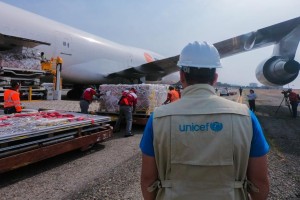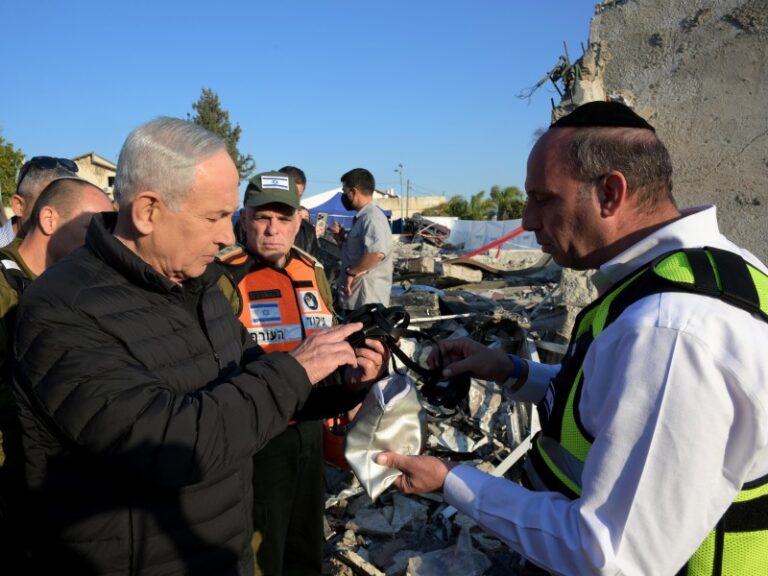
Photo credit: UNICEF/UNI319459/Rocio Ortega
Photo credit: UNICEF/UNI319459/Rocio Ortega
Copenhagen/Geneva/New York / Oslo: UNICEF today launched the Humanitarian Airfreight Initiative with leading airlines supporting the prioritization of the delivery of COVID-19 vaccines, essential medicines, medical devices and other critical supplies to respond to the pandemic.
The participation of the airline industry is vital to support equal access to vaccines worldwide.
“The new initiative will also act as a global logistics preparedness mechanism for other humanitarian and health crises over the longer term. The participating airlines cover routes to more than 100 countries in support of COVAX,” Stéphane Dujarric, Spokesman for the United Nations Secretary-General, told mediapersons in New York today.
Under this landmark initiative, over 10 leading airlines have signed agreements with UNICEF to support the prioritization of delivery of COVID-19 vaccines, essential medicines, medical devices and other critical supplies to respond to the pandemic.
“Delivery of these life-saving vaccines is a monumental and complex undertaking, considering the sheer volumes that need to be transported, the cold chain requirements, the number of expected deliveries and the diversity of routes” said Etleva Kadilli, Director of UNICEF Supply Division, in Copenhagen. “We are grateful to these airlines for joining forces with the UNICEF Humanitarian Airfreight Initiative to support the roll-out of COVID-19 vaccines,” Kadilli said.
The UNICEF Humanitarian Airfreight Initiative brings together the airlines covering routes to over 100 countries, in support of the COVAX Facility – the global effort aimed at equitable access to COVID-19 vaccines. In addition to prioritizing shipments of these life-saving supplies, the airlines will take measures such as temperature control and security, while also adding freight capacity to routes where needed. Their commitments are critical to the timely and secure delivery of vaccines and critical supplies.
Under COVAX, UNICEF is leading the procurement and delivery of quality-assured COVID-19 vaccines for low-income and lower-middle-income countries. Based on the COVAX Facility’s indicative distribution and first round allocation plan, 145 countries will receive doses to immunize around three per cent of their population, on average, starting in the first half of 2021, subject to all requirements being met and final allocation plans.
Safe, timely and efficient transportation of life-saving supplies is critical to supporting access to essential services for children and families, and the aviation industry’s role in this is critical. COVAX deliveries and the subsequent vaccination of frontline workers will support health and social care systems to safely resume these critical services, the UNICEF stated.
The airlines supporting the UNICEF initiative are AirBridgeCargo, Air France/KLM, Astral Aviation, Brussels Airlines, Cargolux, Cathay Pacific, Emirates Skycargo, Ethiopian Airlines, Etihad Airways, IAG Cargo, Korean Air, Lufthansa Cargo, Qatar Airways, SAUDIA, Singapore Airlines Ltd, and United Airlines.
Meanwhile, the World Health Organisation announced in Geneva that building on the early information provided in the interim distribution forecast that was published on February 3, 2021 and documented information on indicative distribution of 240 million doses of the AstraZeneca/Oxford vaccine, licensed to Serum Institute of India (SII), and 96 million doses of the AstraZeneca/Oxford vaccine, under the advance purchase agreement between Gavi, the Vaccine Alliance and AstraZeneca for Q1 & Q2 2021, COVAX will now complete the process of final Q1/Q2 allocations of the AstraZeneca/Oxford vaccine to Facility participants.
Also read: WHO lists 2 additional COVID-19 vaccines for emergency use and COVAX roll-out
Information on these final allocations will be communicated to all participants and published online the week of February 22nd, the WHO stated today. It may be mentioned that the two versions of the AstraZeneca/Oxford COVID-19 vaccine had been given WHO Emergency Use Listing (EUL) on February 15, which meant that these two versions were now available for global rollout through the COVAX Facility.
In preparation for this unprecedented global rollout, the COVAX partners (The Coalition for Epidemic Preparedness Innovations (CEPI), the Vaccine Alliance (Gavi) and the World Health Organization , as co-leads of the COVAX initiative for equitable global access to COVID-19 vaccines, alongside key delivery partner UNICEF), have been working closely with all Facility participants for many months, providing support for regulatory and indemnity and liability issues as well as the submission of completed national deployment and vaccination plans (NDVPs).
“Throughout this process, Facility participants have been moving at speed to ensure all preparations are in place for the first deliveries,” the WHO stated.
– global bihari bureau






👌👌good news